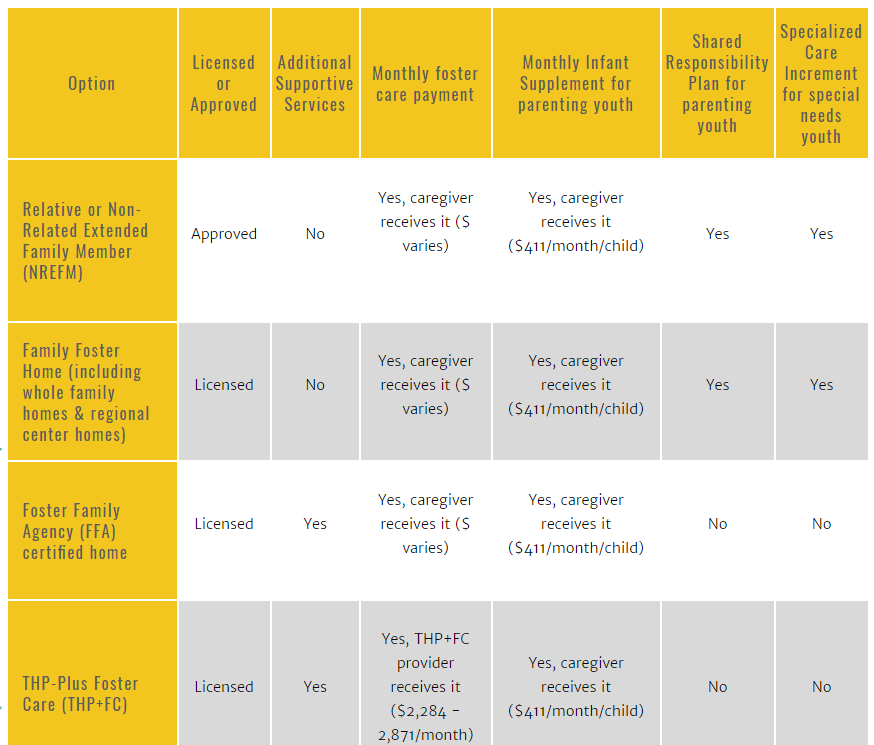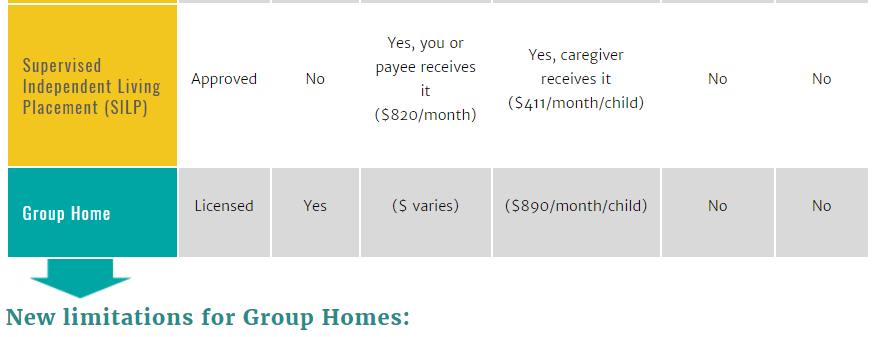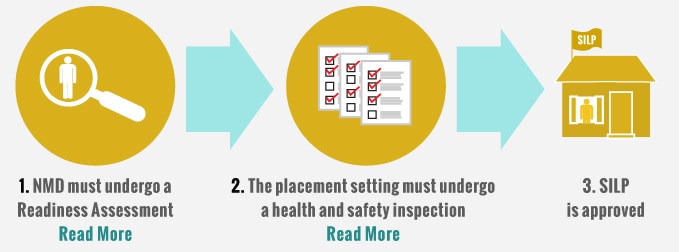The California Fostering Connections to Success Act allows a youth to remain in a group home placement after age 18 and up to age 19 in order to promote educational stability. After the youth graduates from high school or an equivalent program (i.e. GED) or turns age 19, continuation in a group home is prohibited unless it is necessary due to a medical condition.
There are limited circumstances where a youth can remain in a group home after either completing high school or turning 19.
THP-Plus Foster Care (THP+FC) is a licensed supervised placement available to youth in extended foster care, ages 18 to 21. It is modeled after the existing THP‐Plus program for non‐dependents, and provides youth with housing and supportive services in an age‐appropriate setting.For more information on THP+FC, click hereThe Supervised Independent Living Placement (SILP) is a new placement option for youth in extended foster care. A SILP may include apartment living, room and board arrangements, college dorms and shared roommate settings.For more information on the SILP, click here
There are limited circumstances where a youth can remain in a group home after either completing high school or turning 19.
- First, if the NMD has a medical or mental health condition and remaining in that home serves as a short‐term placement until a more long‐term housing option is found.
- Second, if a youth is getting treatment services to alleviate a medical condition and qualifies for extended foster care under the removing barriers to employment participation condition, s/he can still continue in a group home under condition #5, “medical condition.”
THP-Plus Foster Care (THP+FC) is a licensed supervised placement available to youth in extended foster care, ages 18 to 21. It is modeled after the existing THP‐Plus program for non‐dependents, and provides youth with housing and supportive services in an age‐appropriate setting.For more information on THP+FC, click hereThe Supervised Independent Living Placement (SILP) is a new placement option for youth in extended foster care. A SILP may include apartment living, room and board arrangements, college dorms and shared roommate settings.For more information on the SILP, click here
THP-Plus Foster Care (THP+FC)
is a licensed placement for youth, ages 18-21 who are participating in extended foster care made available by Assembly Bill 12. THP+FC is modeled after the original THP-Plus Program, and provides housing and comprehensive supportive services. THP+FC providers are certified by county departments of social services and licensed as Transitional Housing Placement Providers by the Community Care Licensing (CCL) Division of the California Department of Social Services.
is a licensed placement for youth, ages 18-21 who are participating in extended foster care made available by Assembly Bill 12. THP+FC is modeled after the original THP-Plus Program, and provides housing and comprehensive supportive services. THP+FC providers are certified by county departments of social services and licensed as Transitional Housing Placement Providers by the Community Care Licensing (CCL) Division of the California Department of Social Services.
The Transitional Housing Placement Plus (THP-Plus) Program
provides affordable housing and comprehensive supportive services for up to 24 months to help former foster care and probation youth ages 18 to 24 make a successful transition from out-of-home placements to independent living. The program is administered by county departments of social services who either provide the services directly or contract for services with nonprofit THP-Plus providers.
THE DIFFERENCE BETWEEN TRANSITIONAL HOUSING PLACEMENT PLUS (THP-PLUS) AND THP-PLUS FOSTER CARE (THP+FC)
Q: How are THP Plus and THP Plus Foster Care different?
A: There are several differences between THP-Plus and THP-Plus Foster Care. First, THP-Plus Foster Care (THP+FC) is for youth participating in extended foster care who are between the ages of 18-21, while THP-Plus is for youth that have either opted-out of or aged out of extended foster care and serves youth ages 18-24. Second, THP+FC is a licensed placement, while THP-Plus is approved by the county. This means that THP+FC providers must comply with licensing rules set by Community Care Licensing. Third, THP+FC is a program for youth who are continuing in extended foster are, and thus the youth in THP+FC will continue to have monthly visits with their case manager (social worker or probation officer) and a 6-month court review hearings. Youth participating in THP-Plus have either opted out of or aged out of extended foster care, and therefore are not subject to any of the requirements that govern placements for youth who are still in foster care.
Citation: Senate Bill 1013
Q: How are THP Plus and THP Plus Foster Care different?
A: There are several differences between THP-Plus and THP-Plus Foster Care. First, THP-Plus Foster Care (THP+FC) is for youth participating in extended foster care who are between the ages of 18-21, while THP-Plus is for youth that have either opted-out of or aged out of extended foster care and serves youth ages 18-24. Second, THP+FC is a licensed placement, while THP-Plus is approved by the county. This means that THP+FC providers must comply with licensing rules set by Community Care Licensing. Third, THP+FC is a program for youth who are continuing in extended foster are, and thus the youth in THP+FC will continue to have monthly visits with their case manager (social worker or probation officer) and a 6-month court review hearings. Youth participating in THP-Plus have either opted out of or aged out of extended foster care, and therefore are not subject to any of the requirements that govern placements for youth who are still in foster care.
Citation: Senate Bill 1013
The Supervised Independent Living Placement (SILP)
is one of the new placement options for youth participating in extended foster care. Of all placement options available, the SILP provides the least amount of support and supervision, and the highest amount of autonomy. The SILP is not a licensed placement, but one that is approved by a NMD’s county social worker or probation officer.
ELIGIBLE LIVING SETTINGS FOR A SILP:
Private market housing
- Apartment
- Renting a room
- Single Room Occupancies (SROs)*
SILPs are appropriate for those NMDs who are high functioning (mentally sound and able to live without supportive services) and able to live independently (free from adult guidance, supervision and services, other than a monthly visit from a social worker or probation officer).
The exception is a SILP that includes assistance from a permanent connection, including tribal member, in addition to a social worker or probation officer, which could include living skills training.
TEPS TO APPROVING A SILP:Once the SILP has been approved, a SILP Approval and Placement Agreement (SOC 157A) is completed by the NMD’s social worker or probation officer along with the NMD.
For more information on SILP related topics, such as moving from one SILP to another, and residing in a SILP out of state, refer to the AB 12 Primer.
California Social Work Education Center (CalSWEC) training for social workers and probation officers which provides information and guidelines to assist with the process of approving a SILP placement, is accessible by following this LINK.
For more information on SILP related topics, such as moving from one SILP to another, and residing in a SILP out of state, refer to the AB 12 Primer.
California Social Work Education Center (CalSWEC) training for social workers and probation officers which provides information and guidelines to assist with the process of approving a SILP placement, is accessible by following this LINK.



